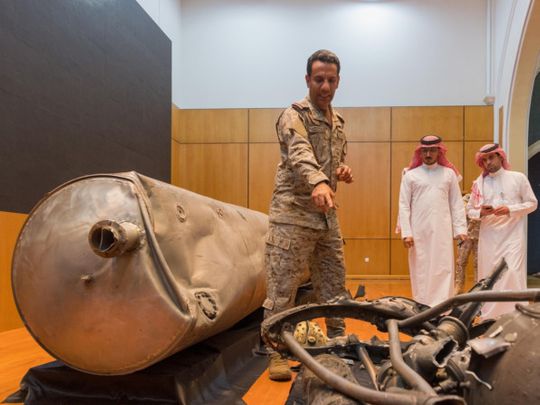
Dubai: Yemen has been seen as a significant concern by the World Health Organisation since the outbreak of the coronavirus over a month ago, due to the ongoing war and the near collapse of the health system in the Arab world’s poorest country.
However, on Saturday and while the world’s attention was focussed on the coronavirus pandemic, Al Houthis launched two ballistic missiles targeting two Saudi cities, the capital Riyadh and the southern city of Jazan.
As Yemen is gripped by the an outbreak fear and shortage of essential food and medicine supplies, Al Houthis are seemingly trying to divert attention from their poor management of the areas they occupy where the people’s anger is rising. In addition, their backers in Iran also feel the pubic heat domestically due to the government’s poor response to the coronavirus outbreak probably pushed for an escalation in Yemen to score political points with its hardline opposition.
The Arab coalition, which has been fighting the Iranian-backed Al Houthi militia to restore Yemen’s legitimate government, has almost stopped its operations and turned its focus on helping the ravaged country to combat the COVID-19 pandemic.
Al Houthi missiles were intercepted over the two Saudi cities and did not cause any casualties. “Two civilians were slightly injured due to the falling of the intercepted missile’s debris as it exploded in mid-air over residential districts,” Saudi Civil Defence spokesman Lt. Colonel Mohammed Al Hammadi was quoted by Saudi media as saying.
'Dismayed'
The United Nations special Yemen envoy Martin Griffiths condemned the attack. “I am gravely dismayed and disappointed by these actions. Yemen needs its leaders to focus every minute of their time on averting and mitigating the potentially disastrous consequences of a COVID-19 outbreak,” he said.
Yemen has so far not reported any COVID-19 case but WHO and international aid groups warned that a possible outbreak in Yemen would be catastrophic. WHO said an outbreak will “overrun” the already dilapidated hospitals and health facilities. Unicef, the UN’s children fund, said Yemen was in urgent need of water, sanitation and hygiene assistance.
Nevertheless, reports from northern Yemen, the stronghold of the Al Houthi militia, indicate that the extremist group has not taken any pre-emptive measure to prevent the potential outbreak that could hit the area at any time. Life in Sana’a goes on normally and gatherings have not been regulated or restricted as advised by WHO. Food prices have soared and hygiene products have disappeared from the market. Reports from inside Yemen suggest that businesses close to the Al Houthi leaders are being allowed to exploit the public health concerns to restrict the supplies in order to raise the prices. Shops selling Yemen’s traditional narcotics, like qat, are still open. Al Houthis reportedly control the qat trade because of its large revenues.
False victory
As the people’s anger rises, Al Houthis may well have thought an attack on Saudi Arabia can divert the public attention by claiming false victory, which would also resonate very well with their backers in Tehran, who have invested huge money and arms in their militia proxy to fight against the Saudi-led Arab coalition.
Iran has another motive in escalating the war. Hardliners in Tehran, who are pushing for more involvement in Yemen, Iraq and Lebanon to expand Iran’s influence in the Arab region, have been very critical of the Rouhani government’s inadequate response to the coronavirus outbreak. Nearly 42,000 people have been infected and more than 2,700 hae died in Iran since February. Regime critics point out that the government’s reluctance to acknowledge the outbreak when it first hit in the second week of February led to the rapid rise in infections.
Therefore, an attack on Riyadh by its Al Houthi proxy could be the solution to calm down the hardliners’ anger and divert regional attention from the bungled handling of the outbreak. Most cases in the region have originated in Iran, official numbers in Gulf states show.
The UN has been pushing for peace talk to end the Yemen war and focusing all attention on fighting the COVID-19 outbreak. However, Yemen observers believe that with Al Houthi and Iran using the war for their own domestic gains, the UN initiative might be a mission impossible.








